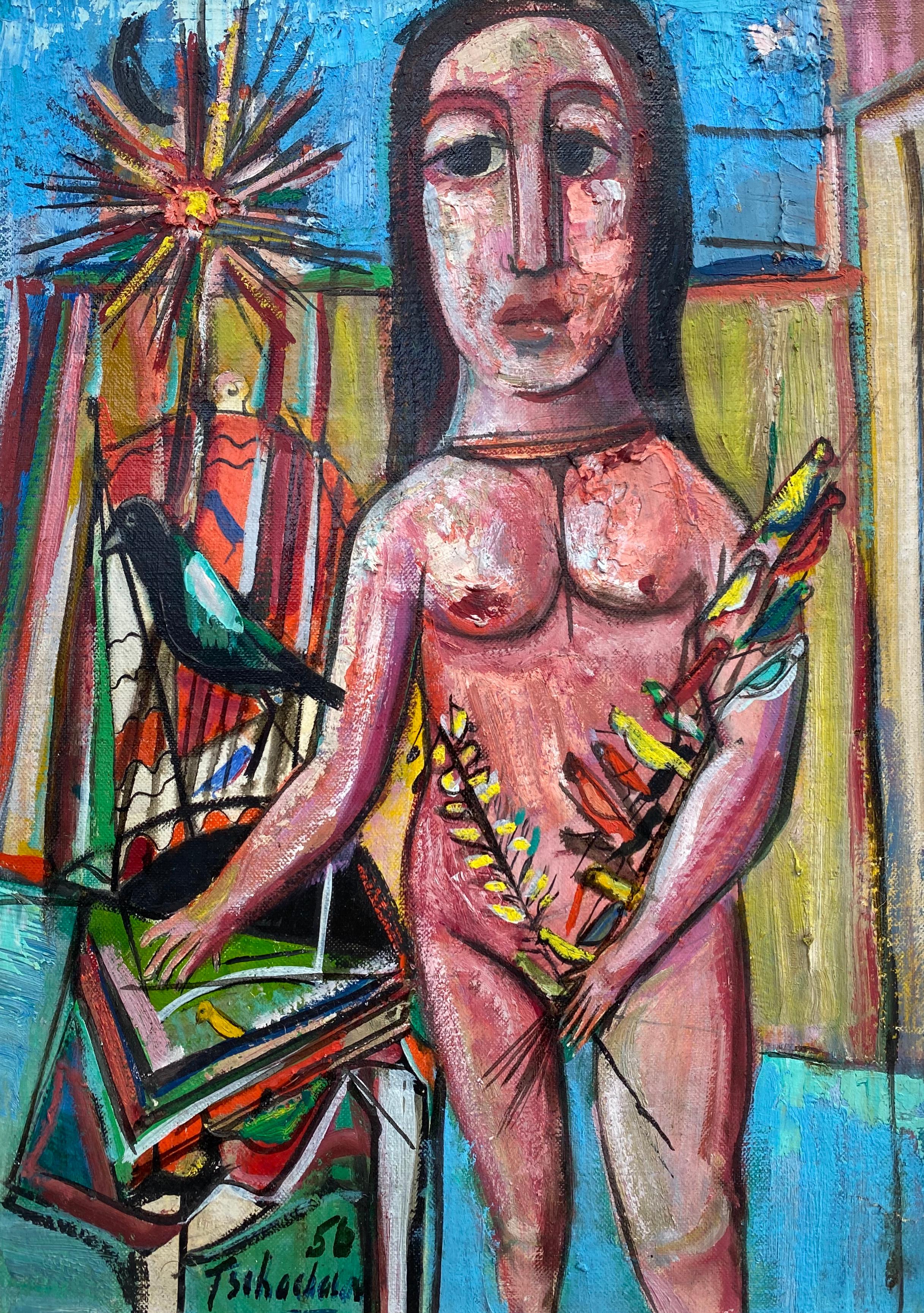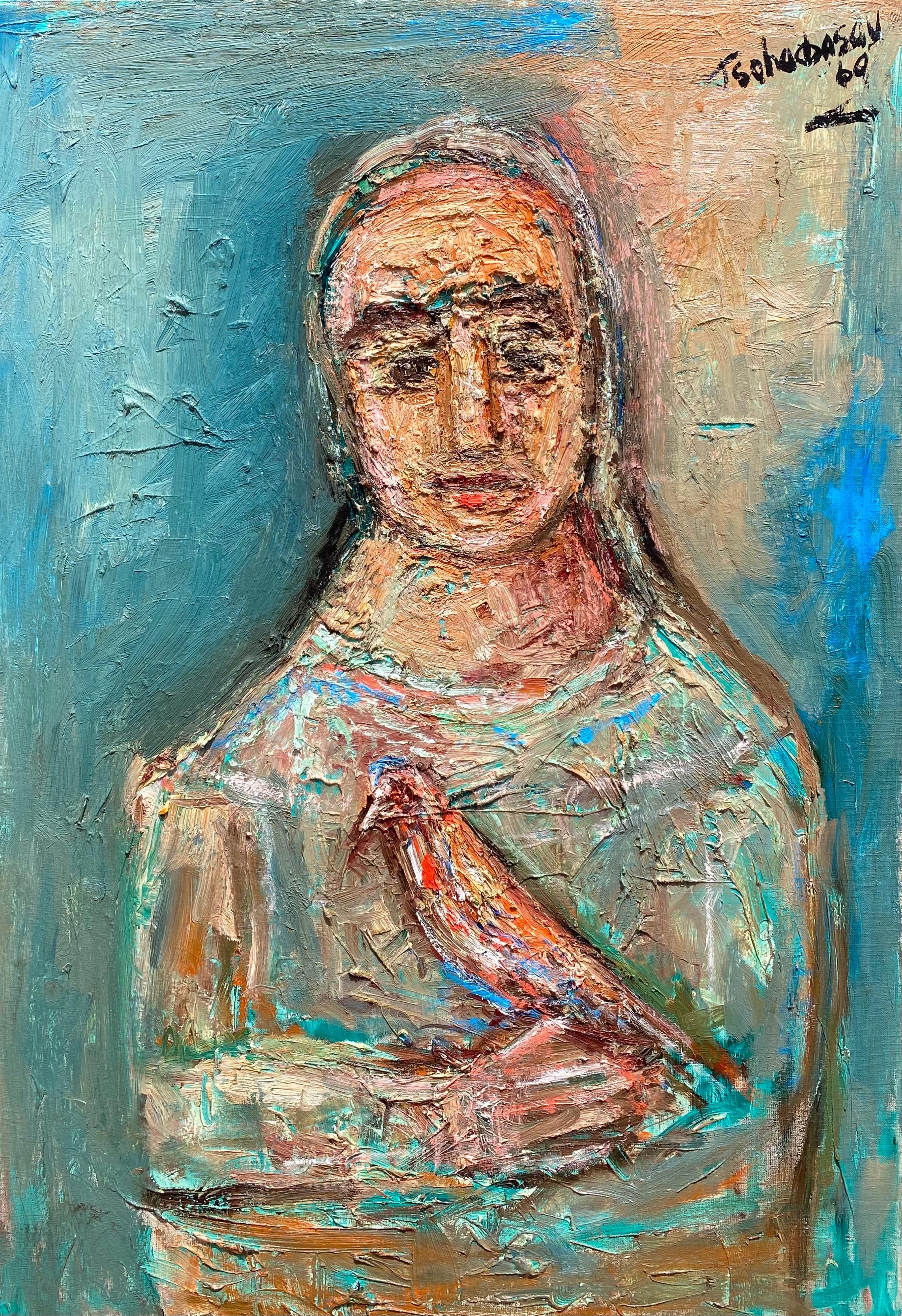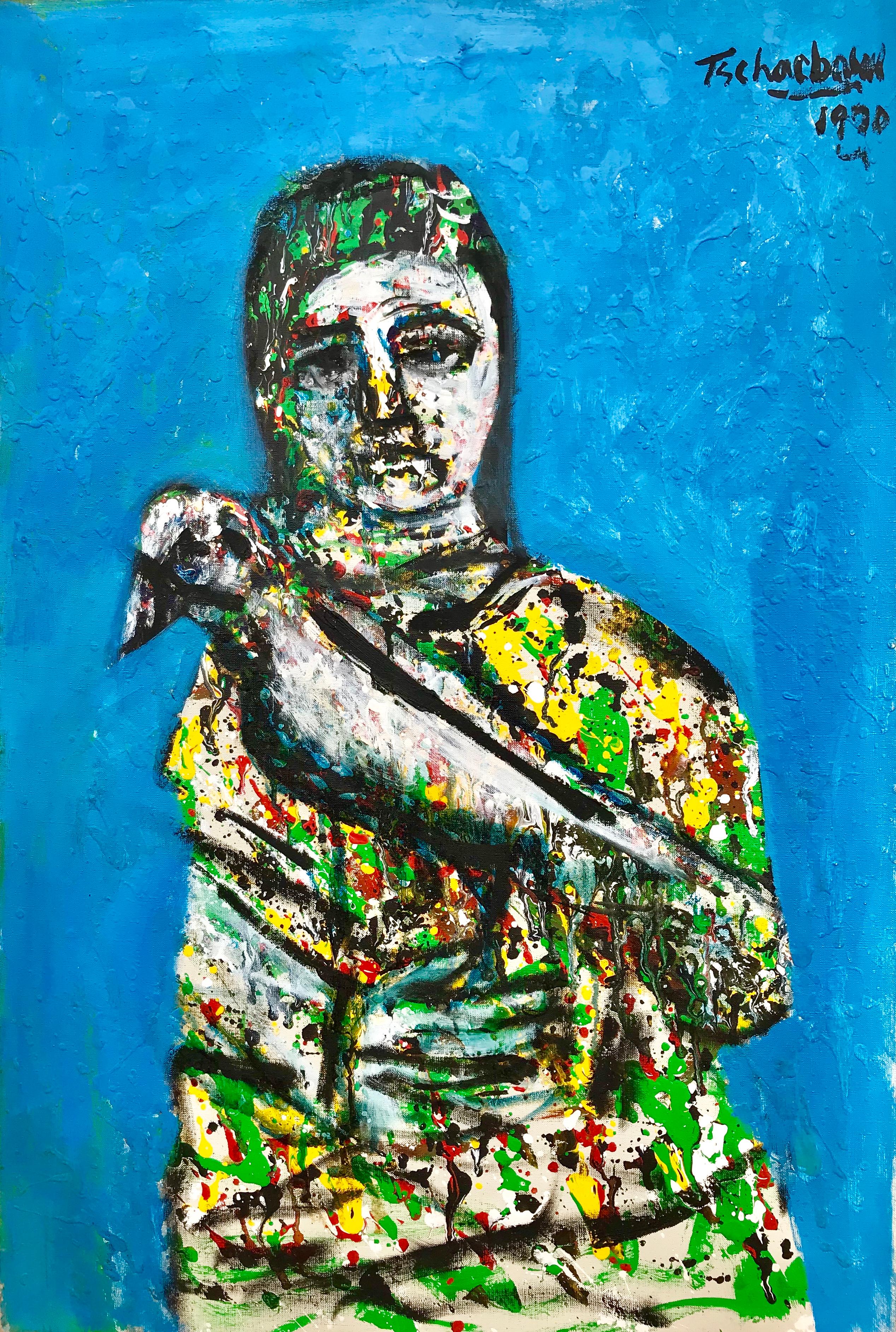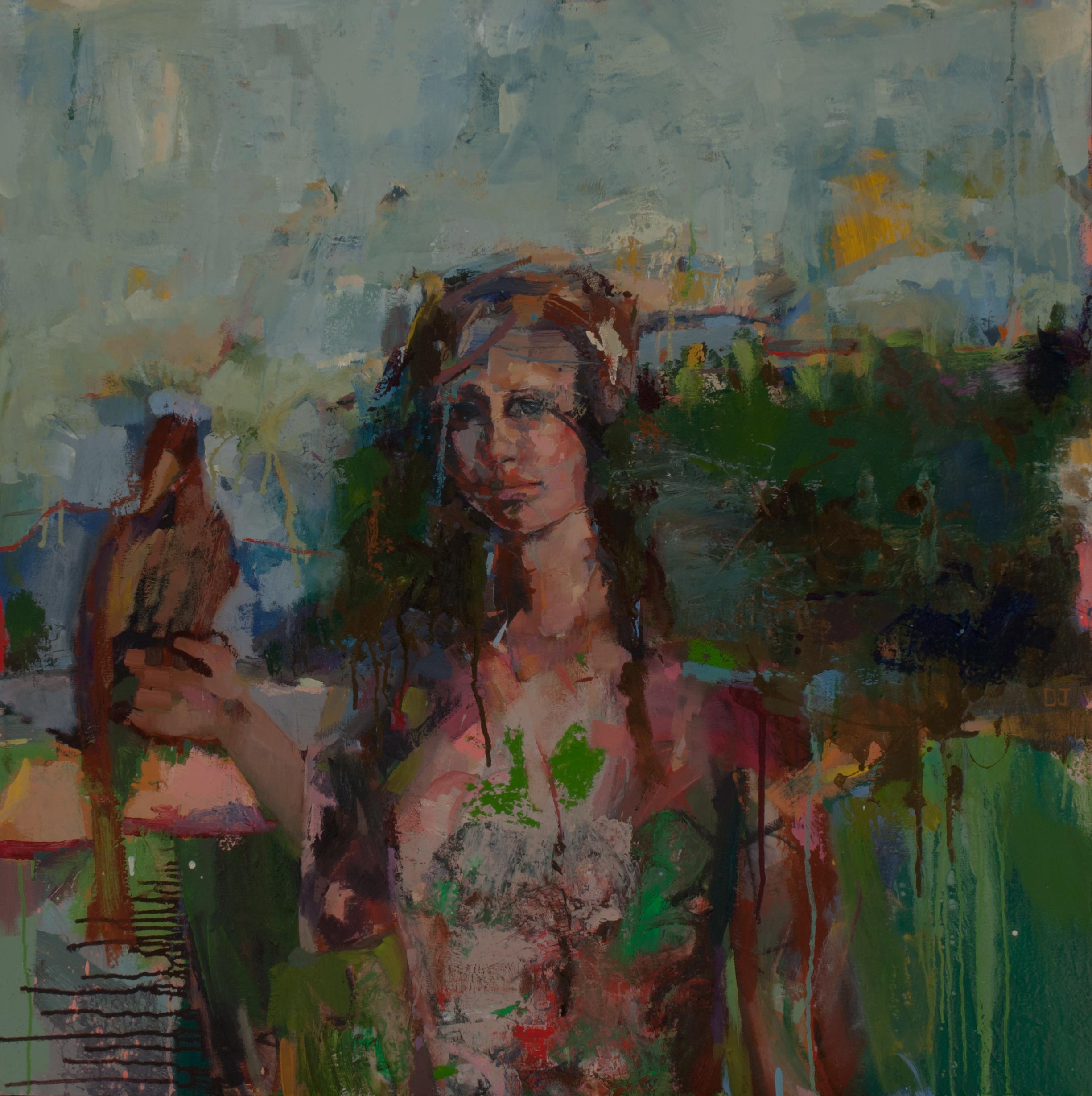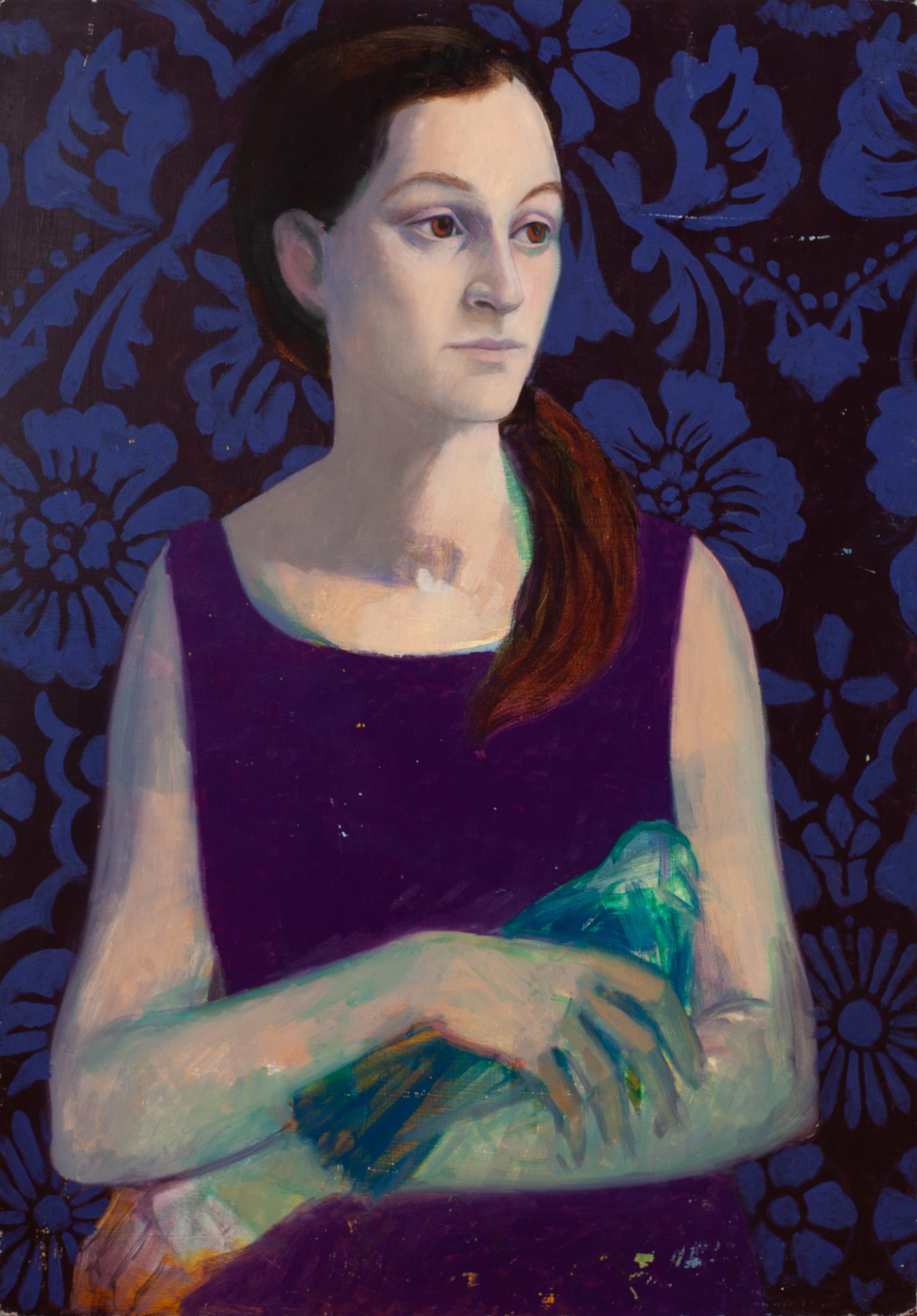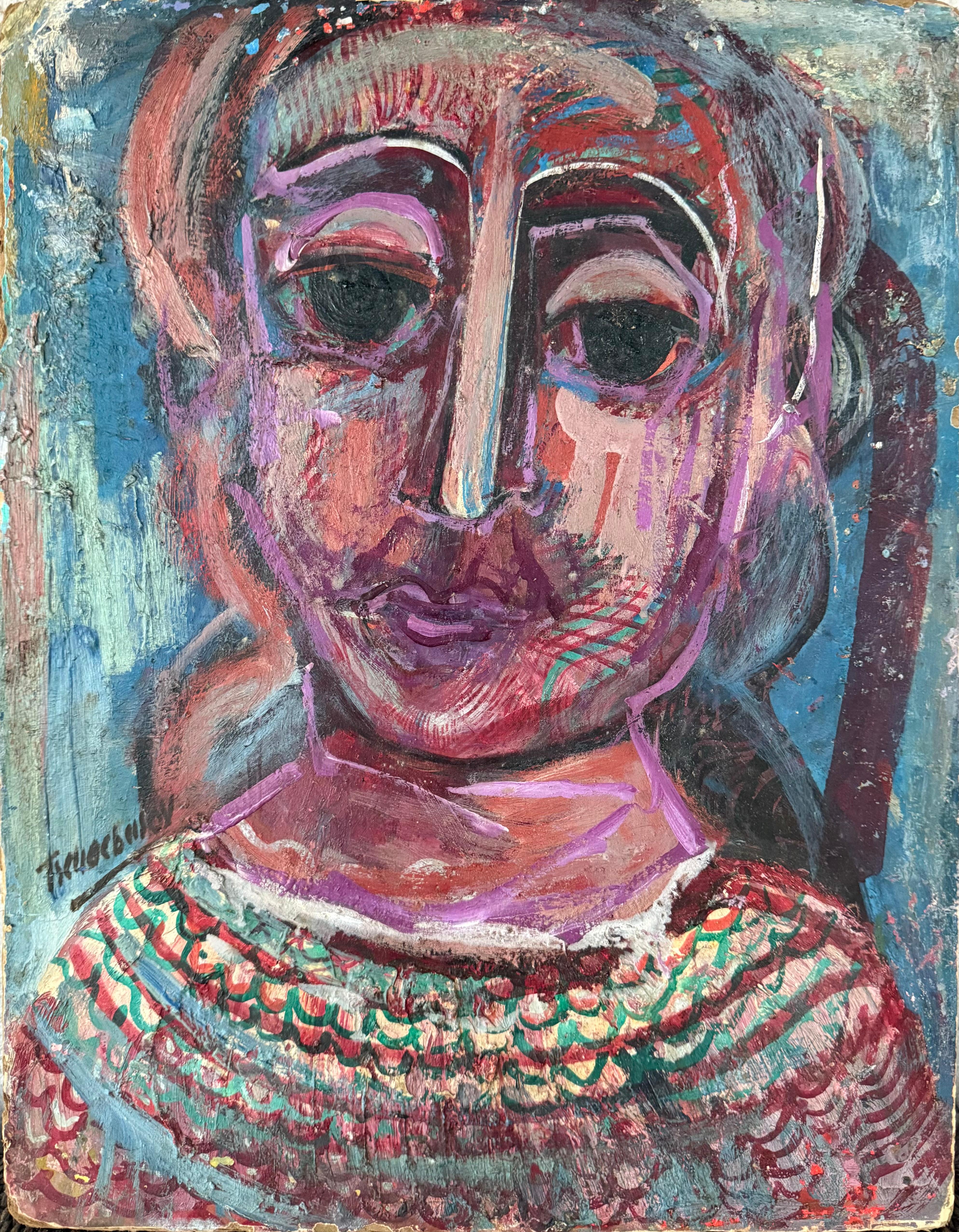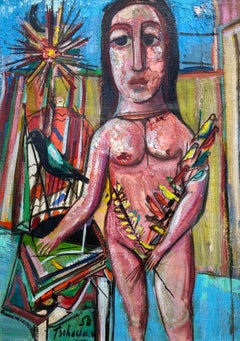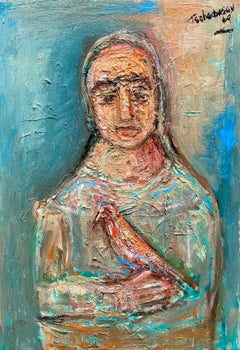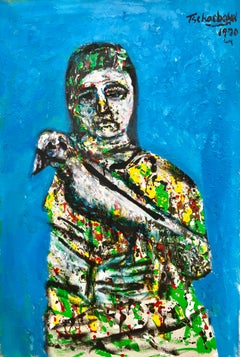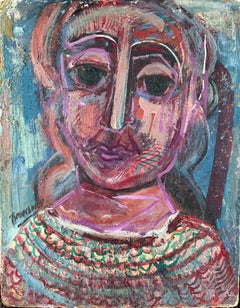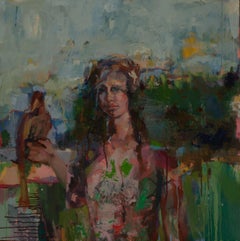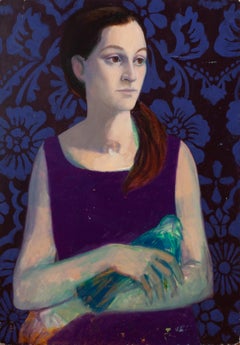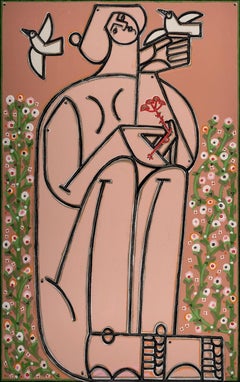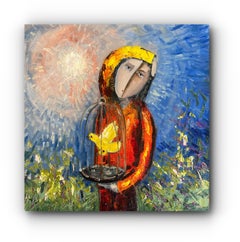Want more images or videos?
Request additional images or videos from the seller
1 of 12
Nahum Tschacbasov“Woman and Birds”1949
1949
$4,600
$5,75020% Off
£3,435.98
£4,294.9720% Off
€3,983.47
€4,979.3420% Off
CA$6,386.99
CA$7,983.7320% Off
A$7,158.99
A$8,948.7320% Off
CHF 3,727.47
CHF 4,659.3420% Off
MX$87,414.31
MX$109,267.8820% Off
NOK 47,325.39
NOK 59,156.7420% Off
SEK 44,860.21
SEK 56,075.2720% Off
DKK 29,721
DKK 37,151.2620% Off
Shipping
Retrieving quote...The 1stDibs Promise:
Authenticity Guarantee,
Money-Back Guarantee,
24-Hour Cancellation
About the Item
Mid-century oil on masonite modern painting by the well known Russian/American artist, Nahum Tschacbasov. Signed top left and dated 1949. Titled verso. Condition is fair. Provenance: Estate of Leonard Barton, the stepson of Nahum Tschacbasov. Presently unframed.
Russian-American artist Nahum Tschacbasov (1899-1984) is known for his cubo-surrealistic works which feature a strong psychological element. Some of his work bears a resemblance to work of another Russian-American artist--David Burliuk. He was somewhat of a late starter, moving to Paris in 1932 to study under Adolph Gottlieb, Marcel Gromaire and Fernand Leger. He had his first exhibition in Paris in 1934. He then returned to the US where he joined Rothko and Gottlieb at the Galery Seccession. He was one of the co-founders of The Ten, a group of social conscious abstract painters which included Rothko, Gottlieb, Joseph Solman and Ilya Bolotowsky, among others.
In 1944, he began to work at Stanley Hayter's Atelier 17, a center for surrealistic ideas. Between 1936 and 1943, he had five one-man exhibitions at the ACA Galleries and participated in five group shows. He also exhibited at the Whitney, the Pennsylvania Academy of Fine Arts, the Knox Albright Museum, the Chicago Institute of Fine Art and Corcoran, among others. His work can be found in the permanent collections of the Met, the Whitney, the Brooklyn Museum and the Jewish Museum.
Tschacbasov has been the subject of two recent retrospective at Fletcher Gallery, Woodstock, New York and the second at my gallery, Arthur T. Kalaher Fine Art in Southampton, NEw YorkHe was the subject of a retrospective at the National Arts Club entitled: "Nahum Tschacbasov: A Retrospective" in 2013.
- Creator:Nahum Tschacbasov (1899-1984, American)
- Creation Year:1949
- Dimensions:Height: 36 in (91.44 cm)Width: 24 in (60.96 cm)Depth: 0.25 in (6.35 mm)
- Medium:
- Movement & Style:
- Period:
- Condition:The painting has been restored. Mainly in the area of the birds and the bottom two corners.
- Gallery Location:Southampton, NY
- Reference Number:1stDibs: LU1418669512
About the Seller
5.0
Platinum Seller
Premium sellers with a 4.7+ rating and 24-hour response times
Established in 1977
1stDibs seller since 2013
536 sales on 1stDibs
Typical response time: <1 hour
- ShippingRetrieving quote...Shipping from: Southampton, NY
- Return Policy
Authenticity Guarantee
In the unlikely event there’s an issue with an item’s authenticity, contact us within 1 year for a full refund. DetailsMoney-Back Guarantee
If your item is not as described, is damaged in transit, or does not arrive, contact us within 7 days for a full refund. Details24-Hour Cancellation
You have a 24-hour grace period in which to reconsider your purchase, with no questions asked.Vetted Professional Sellers
Our world-class sellers must adhere to strict standards for service and quality, maintaining the integrity of our listings.Price-Match Guarantee
If you find that a seller listed the same item for a lower price elsewhere, we’ll match it.Trusted Global Delivery
Our best-in-class carrier network provides specialized shipping options worldwide, including custom delivery.More From This Seller
View All“Woman with Birds”
By Nahum Tschacbasov
Located in Southampton, NY
Original mid-century modern oil on canvas board painting of a woman with birds by the well known Russian/American artist Nahum Tschacbasov. Signed and ...
Category
1950s American Modern Nude Paintings
Materials
Oil, Canvas
“Woman Holding Bird”
By Nahum Tschacbasov
Located in Southampton, NY
Heavy impasto oil on canvas original painting by the well known Russian/American artist, Nahum Tschacbasov. Signed and dated top right, 1969. Signed and dated verso as well. Artist ...
Category
1960s Post-Modern Figurative Paintings
Materials
Canvas, Oil
“Woman with Large Bird”
By Nahum Tschacbasov
Located in Southampton, NY
Oil, acrylic and drip painting on linen canvas by the well know Russian/American artist, Nahum Tschacbasov. Signed upper right and dated 1970. Signed and dated verso as well. Condit...
Category
1970s Post-Modern Figurative Paintings
Materials
Canvas, Oil, Acrylic
$3,360 Sale Price
20% Off
"Surreal Woman"
By Nahum Tschacbasov
Located in Southampton, NY
Original oil on fiberboard painting by the Russian/American artist, Nahum Tschacbasov. Signed lower left. Circa 1945. Condition is good. Presently unframed. Framing options are av...
Category
1940s Post-Modern Abstract Paintings
Materials
Oil, Fiberboard
"Mystic Woman"
By Nahum Tschacbasov
Located in Southampton, NY
This is a oil on masonite painting by Nahum Tschacbasov done in 1946. Signed lower left and housed in a hand carved wood frame circa 1920. Overall size with frame is 40 x 33 inches.
Category
1940s Abstract Expressionist Figurative Paintings
Materials
Oil, Masonite
$12,800 Sale Price
20% Off
“The Bird”
By Nahum Tschacbasov
Located in Southampton, NY
Original acrylic paint on canvas of a large bird at rest by the Russian/American artist, Nahum Tschacbasov. Signed lower right and dated 1980. Artist inventory label upper right on ...
Category
1980s Contemporary Figurative Paintings
Materials
Canvas, Acrylic
$2,240 Sale Price
20% Off
You May Also Like
Woman with Bird
By Devorah Jacoby
Located in Mill Valley, CA
oil on canvas
Category
2010s Contemporary Figurative Paintings
Materials
Canvas, Oil
Woman with Bird
Located in Columbia, MO
JERRY BERNECHE
Woman with Bird
Oil on panel
24 x 16.75 inches
Category
21st Century and Contemporary Contemporary Figurative Paintings
Materials
Oil
Bird and Female Figure, Woman with Doves by America Martin
By America Martin
Located in 326 N Coast Hwy. | Laguna Beach, CA
America Martin
"Woman with Doves"
Oil & Acrylic on Canvas
85 x 53.25 inches
86.5 x 54.5 framed
Exploring the identity of both her namesake and country, LA-based America Martin draws...
Category
2010s Contemporary Figurative Paintings
Materials
Canvas, Oil, Acrylic
$22,120 Sale Price
20% Off
Girl with Bird (Contemporary Abstract Figurative Painting)
By Alex Garncarek
Located in New Orleans, LA
Alex Garncarek has created a magical world that looks like no other - distinctly his own, like artists such as Paul Klee, Miro and others whose visions came directly from their imagi...
Category
2010s Abstract Paintings
Materials
Oil
$380 Sale Price
20% Off
Contemporary English Painting 'Woman with Birds' by Cornelia O’Donovan
Located in Gloucestershire, GB
Large and beautiful contemporary painting by Cornelia O’Donovan (RCA, MA) 'Woman with Birds'.
Signed version 'Cornelia O Donovan', 2023.
Cornelia’s art is shown in several galleries ...
Category
21st Century and Contemporary British Modern Paintings
Materials
Canvas, Paint
Woman with Birds
By Sunol Alvar
Located in San Francisco, CA
Artist: Alvar
Title: Woman with Birds
Year: c.1980
Medium: Color lithograph
Paper: Wove
Image size: 18.5 x 24.5 inches
Framed size: 26.5 x 32.65 inc...
Category
Late 20th Century Romantic Figurative Prints
Materials
Lithograph
